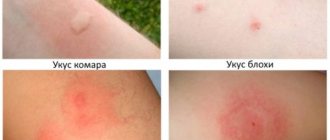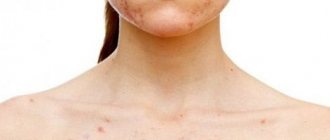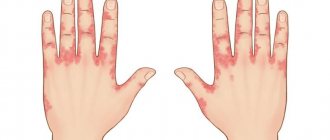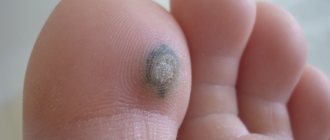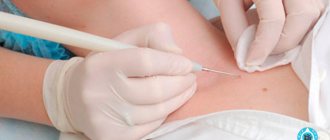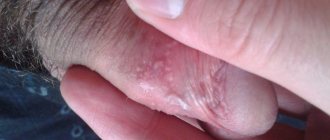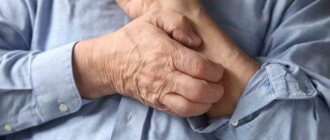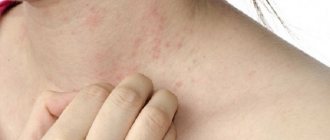Night itching, spreading throughout the body, is a rather unpleasant condition that significantly reduces the quality of rest.
If sleep becomes inadequate, irritability increases during the day, physical activity decreases, and mental performance decreases significantly. If the condition is protracted, it will significantly affect memory, and the psycho-emotional balance will be disrupted, which will lead to the development of depression. Why do I itch at night? This is a reasonable question that every person who is faced with nighttime body itching asks himself. We will try to answer it in this article. In addition, we will consider the most effective methods of treating this symptom.
Mechanism of itching
Itching is a protective reflex that allows you to cleanse the skin and neutralize irritants that have mechanical, chemical and other effects. The symptom is determined by the innervation of the skin and develops due to irritation of receptors or nerve endings. Receptors respond to stimuli and transmit signals to the brain along nerve fibers. Itching is caused by thermal, chemical, mechanical, electrical stimulation. But nerve endings can be excited indirectly due to the release of mediators - substances synthesized by the human body that trigger various responses and protective reactions.
Itching is caused by various reasons and is accompanied by other manifestations: tingling, peeling, keratinization of the skin, rashes. There are also general symptoms that are not related to dermatological ones and depend on the specific disorders that provoked the problem.
Itching during pregnancy
Changes in hormonal levels during pregnancy can cause itchy skin. Most often - in the abdominal area.
This is also caused by excessive stretching of the skin. Unpleasant sensations intensify at the end of pregnancy or after a large jump in weight.
If the skin itches but there is no rash, no specific treatment is required. You can take valerian tincture for 2 weeks. It is useful to lubricate the skin of the abdomen with moisturizing creams with the addition of essential oils and vitamin E.
Also, a pregnant woman needs to establish a daily routine: spend more time in the fresh air, sleep at least 8-10 hours a day, eat right.
External factors
Why does itching occur at night? It is often provoked by external factors:
- Poor quality bedding or sleeping clothes. Products made from synthetic, dense, prickly, airtight materials have an irritating effect on the skin, causing the sleeper to itch and wake up. If the fabric does not “breathe” and does not evaporate moisture, then sweat remains on the skin, causing itching. Some natural or chemical-based materials contain allergens that negatively affect the epidermis.
- Allergic reactions. External allergens may be present in laundry detergent, sleeping clothes, bedding, and other products and products that come into contact with the skin. The main manifestations of skin allergies: severe itching, rashes, hyperemia, swelling, redness.
- If the body itches strongly in different places at night, the cause of the symptom is insect bites. A person can be bitten by various blood-sucking insects that live in the bedroom, in individual elements of the interior or on the body of the sleeper: mosquitoes and midges, bedbugs, fleas, lice, ticks. This reason can be identified by obvious bite marks: they look like red or pink spots of different sizes and shapes, having small, barely noticeable holes in the center (punctures left by the insect's mouthparts).
- Improper body care, non-compliance with personal hygiene rules: use of inappropriate or aggressive detergents, infrequent showering or bathing.
Endocrinological problems and allergic reactions
When the area of the ear canals, anus and genitals itch for no apparent reason, the patient should check their blood sugar levels, since itching of these areas of the body often occurs in people with diabetes.
Mild and intermittent discomfort on the surface of the skin may indicate a dysfunction of the thyroid gland.
Patients who have it should visit an endocrinologist and make sure that they do not have hypothyroidism, hyperparathyroidism and thyrotoxicosis.
Allergies are often accompanied by itching. It develops as a result of the patient’s body’s immune response to irritants. Allergies can be caused by food (honey, fish, citrus fruits, eggs, cow's milk), as well as cold, pollen, medications, dust, etc. With itching of allergic origin, the skin often turns red, a rash and irritation appear on its surface. In this case, the specialist prescribes the patient treatment with antihistamines, which relieve him of allergy symptoms. To prevent the immune reaction from reoccurring, the patient must continue to avoid contact with allergy triggers.
Severe itching of the skin after exposure to sunlight, which causes suffering to a person, cannot be ignored. This symptom may indicate that he has photodermatosis (allergy to the sun). Treatment of this disease should be carried out under the supervision of a doctor, so a person whose skin itches while being outside in sunny weather should visit a dermatologist or allergist as soon as possible.
Internal factors
Internal causes can cause itching. The symptom accompanies the following diseases and pathologies:
- Allergies are triggered by exposure not only to external allergens that come into contact with the skin, but also internal ones that enter the human body with food, inhaled air or medications taken. Symptoms vary: indigestion, runny nose, dry cough, lacrimation, swelling (including angioedema) and skin manifestations.
- Parasitic infestations: helminthiasis, giardiasis, ascariasis. Parasites feed on the tissues of the human body and secrete waste products and toxic substances that have an irritating effect. There are also numerous microorganisms that live in the dermis.
- Kidney diseases. These paired organs perform metabolic, excretory and other functions, and if their functioning is disrupted, substances that have a toxic effect on various tissues, including the skin, are retained in the body.
- Liver diseases. The organ is responsible for removing toxins, and when they leave the body untimely or remain in it, they gradually penetrate various organs and tissues, reach the dermis and have an irritating effect.
- Cholestasis is a violation of the synthesis or outflow of bile, accompanied by yellowness of the skin, itching, bitter taste in the mouth, darkening of urine, lightening of stool, constipation.
- Endocrine disorders: diabetes mellitus, thyrotoxicosis. The endocrine system performs a number of important functions, including the regulation of metabolic processes and hormonal levels. When the level of individual hormones and other substances changes, the skin suffers.
- Psychogenic scratching is caused by stress, anxiety, nervous strain and overwork suffered during the day. Irritated and excited nerve fibers provoke severe itching that occurs suddenly and for no apparent reason, especially at night.
- Blood diseases: iron deficiency anemia, polycythemia, leukemia, erythremia. Blood penetrates the dermis and directly affects its functioning and condition.
- The body may itch due to some malignant neoplasms. Tumors change the composition of the blood, release toxic compounds, and sometimes affect metabolic processes, reactions occurring in the body and the synthesis of certain substances.
- Pregnancy. During gestation, global changes occur in the body: hormonal levels, metabolism and blood composition change, the skin stretches, and a lack of certain substances occurs. Pregnant women often have an itchy growing belly.
Why does a woman's stomach itch?
If a woman’s stomach itches in the navel area, this means that she will soon become a mother. In this case, you should listen to this sign. Try not to get nervous over trifles, but to be more calm and balanced. After all, how can you get pregnant when you’re depressed? What should those women do who are not expecting or planning a child? So it says that you need to be careful with your partner. Take care of your safety together, dear women.
Stomach itches for anxiety
When it's all about the skin
Itching affects the skin directly, and often the causes lie there. The sign signals the following dermatological diseases and disorders:
- Scabies is a contagious dermatological disease caused by parasites – scabies mites. Pathogens feed on particles of the dermis, move through its layers, “swarming” passages, and secrete waste products that have irritating and toxic effects on the skin. Ticks are active in the dark, which causes symptoms to intensify in the evening before bedtime and at night. Characteristic signs: severe itching, rashes, whitish lines on the body, crusts, peeling.
- Xerosis is increased dryness of the skin. This is not an independent disease, but a symptom caused by vitamin deficiency, improper skin care, exposure to adverse factors, and dermatological diseases. The situation is aggravated by temperature changes (especially cold weather), aggressive detergents and hygiene products, synthetic bedding and clothing, taking a hot bath or shower, and exposure to ultraviolet radiation.
- Psoriasis is a hereditary dermatological disease that manifests itself in the form of itching, localized skin rashes, and peeling.
- Dermatitis is an inflammatory lesion of the epidermis caused by damaging factors.
- Eczema is an inflammatory non-contagious disease accompanied by a recurrent rash, burning, peeling, and itching.
- Ringworm can develop in both children and adults. This is a group of contagious dermatological diseases caused by fungi, bacteria or viruses. With lichen, the skin itches severely day and night, rashes, peeling, and sometimes ulcers, crusts and blisters appear.
- Seborrhea is a pathological condition accompanied by an increase or decrease in the activity of the sebaceous glands. Symptoms often affect the scalp, causing dandruff, flaking of the skin, itching, and hair loss. At night, increased manifestations are caused by contact with bed linen and active friction against it.
Types of itching, their characteristics
Before finding out the causes of body itching without a rash, you should understand what it can be like. According to the area of skin damage, itching occurs:
- Localized. Under such conditions, only the skin in a certain place itches. For example, on the head, arms, legs, face, etc.
- Generalized. Under such circumstances, the patient has itchy skin all over the body, without any other symptoms, but additional symptoms may also appear. It is this type of itching that is considered the most dangerous, since it signals the presence of serious pathological damage to internal organs.
Of great importance are not only the causes of itching on the body without the presence of a rash, but also the frequency of its occurrence. If this symptom is observed on an ongoing basis, and it is also accompanied by other unpleasant phenomena such as insomnia, headaches, swelling or burning of the skin, this is already a very alarming sign.
Even if the skin on the body itches for no apparent reason, and a person feels normal, the itching cannot be ignored. Constantly scratching the itchy area sooner or later leads to the formation of wounds where infection can easily penetrate. And infection of wounds can provoke purulent and inflammatory dermatological diseases.
to the table of contents?
Diagnostics
How can you understand why your whole body itches at night? Consult a doctor and undergo a comprehensive examination that will help identify the causes of the problem. Start by visiting a therapist and talk about your condition. He will prescribe tests and, based on the results obtained, will issue a referral to a specialist: a dermatologist, neurologist, endocrinologist, hepatologist, oncologist, nephrologist, hematologist, allergist or other doctor, depending on the nature of the itching.
To determine the causes, the following diagnostic methods are used:
- Examination and history taking. An experienced specialist is able to make a preliminary diagnosis based on external manifestations and emerging symptoms.
- Laboratory diagnostics include urine and blood tests to evaluate their composition and detect pathological changes.
- Allergy tests allow you to identify and differentiate allergens that provoke unwanted reactions.
- Instrumental methods: ultrasound or X-ray examination, magnetic resonance or computed tomography.
Treatment of itching all over the body
As soon as it becomes clear what causes the itching on the body and the inflammatory factor is found, treatment can begin. In this case, both traditional medicine and medications are used.
In this area, traditional medicine shows its best side.
To forget about itching all over your body once and for all, it will be enough:
- Take a herbal bath. Use only nettle (if the disease is not urticaria), chamomile, mint (menthol essence) or celandine.
- Lemon juice will be a good help to eliminate itching throughout the body. But it is strictly forbidden to apply it to areas with damaged skin.
- Basil is quite suitable for soothing irritated skin. It contains many vitamins that play a key role in skin health. Use a fresh basil leaf to wipe the affected areas.
If finances do not allow you to purchase expensive medicines, traditional medicine will be a good help in many situations. The exception is when the skin develops sores or blisters.
As for treatment with medications, they are prescribed by the attending physician.
The list of medications may vary depending on the severity of the disease, personal symptoms and the individual nature of each person’s body. The general list of medications is as follows :
- Ointment "Erythromycin". Relieves itching, eliminates redness, and has a pleasant cooling property.
- Doxibene tablets are a strong anti-inflammatory antibiotic. It is prescribed strictly according to a doctor's prescription.
- In addition to medications, spicy, salty, bitter and fried foods are removed from the diet.
- An infusion of chamomile tea will help the body calm down and slightly reduce active itching.
Self-medication at home is not excluded. This occurs only in consultation with a specialist. The doctor can register you and create a sickness card so that in case of complications he can provide the necessary assistance.
A number of home self-treatment procedures for itching on the body include:
- Making gauze compresses with burdock roots. Grind the dried roots finely, then add a liter of water and cook for half an hour. After cooking, dip a gauze cloth into the solution and hold for 3-4 minutes. When finished, apply to affected areas. The result comes quickly, within 10–15 minutes.
- Preparation of pine rinse. Pour young pine buds (100–200 g) with a liter of boiling water and cook over low heat for half an hour. Wash your face with the cooled broth and thoroughly rinse the itchy areas. After a few days, the main symptoms should disappear or noticeably decrease.
Related article:
Allergic dermatitis - how to treat it and what does it look like?
If the illness turns out to be of a mental nature, the series of procedures is completely different. Walking in the fresh air, especially in the evenings, will help speed up your recovery. You should devote more time to your favorite activities, narrow your circle of communication only to close and dear people. Thus, in 90% of cases, the root of depression disappears, and along with it the itching goes away.
The remaining 10% are clinical patients; here they need the help of a psychotherapist. The method of psychotherapy will help to find the essence of the disease, to analyze the factors of its occurrence in detail. Then a series of rehabilitation measures are taken, and only after this the patient can be considered healthy.
Older people are not prescribed many medications. The body is in an extremely weakened state, against the backdrop of the manifestation of the disease. In such cases, they often resort to traditional medicine. The effect will be similar, but safer for health.
Note: creams, body lotions and many other cosmetics with a moisturizing effect are essential. They soften the skin, eliminate dryness and inflammation, thereby accelerating the regeneration of damaged skin. Taking a warm bath with soothing herbs also has a beneficial effect on your well-being.
In the room where the patient spends most of his leisure time, it is advisable to maintain a cool temperature. This helps relieve skin conditions on the body.
Treatment
Treatment for night itching depends on the causes of the symptom. The table discusses some individual cases.
| Cause | Solution |
| Allergic reactions | No contact with potential allergens, taking modern antihistamines |
| Parasitic infestations | Taking antiparasitic drugs |
| Dermatological chronic diseases (dermatitis, psoriasis, eczema) | Proper preparation of the diet, selection of suitable detergents and hygiene products, normalization of the emotional and psychological background, local remedies (anti-inflammatory, keratolytic, hormonal) |
| Endocrine diseases | Hormone replacement therapy, drugs that reduce the synthesis of certain hormones |
| Liver diseases | Hepatoprotectors |
| Kidney diseases | Diuretics, agents that dissolve and remove stones (sand, stones) |
| Insect bites | Destruction of insects (mosquito, louse), acceleration of healing of bite marks (use of antiseptics, antihistamines and wound-healing local agents) |
| Dry skin | Air and skin humidification |
If itching interferes with sleep, try using folk remedies. Decoctions of chamomile, oak bark, calendula, sage, and walnut partitions will help remove the symptom. Two tablespoons of raw materials are poured into 500 ml of boiling water. Simmer the mixture over the fire for ten minutes, close, let it brew, strain and add to the bath or use for rubbing. If the epidermis is excessively dry, lubricate the body with olive oil (you can add a few drops of tea tree essential oil, which has regenerating, anti-inflammatory and antiseptic effects). You can take tea with mint and chamomile internally.
It is important to know! Itching should be treated after examination and under the supervision of a doctor. There is no need to scratch your body too much: scratching provokes a violation of the integrity of the skin and increases the risk of infections.
Skin itching “out of the blue”
The most common reason for visiting a dermatologist is itching.
There are cases when there are not even any rashes on the skin, but it itches so much that a person literally tears the skin. The suffering is further aggravated by the fact that everyone around them suspects a simulation or a mental disorder. And, it would seem, it’s not a big problem - a person scratches himself, and that’s it, there are no specific skin diseases, let him be happy. But itching can indicate very serious problems, not to mention the fact that it greatly worsens the patient’s quality of life. Constant itching can lead to depression and even suicide attempts.
The most serious reason
The most important causes of itchy skin are malignant tumors. Itching may be one of the first signs of a tumor and appear before other symptoms. There have been cases when such a difference was up to 5 years!
Paraneoplastic (tumor-associated) skin itching can occur with any tumor, but more often occurs with carcinoma of the stomach, pancreatic cancer, lung, intestinal, brain, breast and prostate cancer. The whole body itches, but there are areas where the itching is more intense.
With Hodgkin's lymphoma, itching is also one of the most common accompanying symptoms and is observed in 25% of patients suffering from this disease.
If “thanks to the itch” you are examined on time, then cancer can be caught in the early, treatable stages.
Water: helps and provokes
Not as fatal as hidden tumors of internal organs, and perhaps the most common cause of itching is simple dry skin.
Modern hygiene requirements include daily showers. In principle, this is correct, but frequent use of detergents, especially in people whose skin is already prone to dryness (and this problem occurs in large numbers among the elderly), causes drying out of the skin. Soap washes away not only dirt, but also substances that retain moisture. As a result, there is itching, but no rashes.
Stop washing? Adherents of the “back-to-nature” concept, and to be honest, some colleagues (usually with a post-war education) advise exactly this. But bacterial and fungal infections will not keep you waiting, and the smell...
So you need to continue to maintain hygiene, but supplement it with special preparations that soften the skin and retain moisture in it (emollients). There are a huge number of them on the market, and they act in different ways; your doctor will tell you what exactly is right for a particular person.
And further. Some people simply don't drink enough water. Especially old people, whose sense of thirst may be dulled, and due to age, they may not remember or may not get what they want due to weakness (yes, that situation when there is no one to give a glass of water).
This leads to much more significant health problems than itchy skin, but also to that. People caring for the elderly should understand the situation and regularly provide water to their charges.
Unfortunately, as practice shows, such patients are often treated with disdain, believing that out of consultations with specialist doctors, only one is necessary - with a psychiatrist.
Yes, such a patient may also have a mental health disorder. But this does not happen as often as society imagines.
Etiology: announce the entire list
In addition to oncology, dry skin and mental status disorders, itchy skin without rashes can be caused by:
- endocrine diseases: hyper- and hypothyroidism, diabetes, hyper- and hypoparathyroidism;
- — neurological diseases: cerebrovascular accidents, multiple sclerosis, peripheral nerve injuries, postherpetic neuralgia;
- — hematological diseases;
- ——Sjogren's syndrome (a systemic disease associated with pathological dryness of the integument).
And also: chronic renal failure, liver disease, biliary tract obstruction, chronic alcoholism (use of psychoactive substances), pregnancy, drug reactions, parasitic infestations, toxic effects of household and industrial chemicals, HIV infection, etc., etc. P.
Therefore, you do not need to undergo a full examination - in this case you will definitely not succeed. You will only waste time, money and nerves. And the reason may remain unclear. Therefore, please leave the search for the cause to your doctor.
How will the doctor deal with this?
At the stage of collecting anamnesis, the doctor will definitely find out the following factors:
- onset (sharp, gradual);
- —flow (continuous, intermittent);
- ——character (stabbing, burning).
—It is also important: whether the itching is localized or “itches everywhere,” how long—it is present and at what time it appears.
The doctor will try to detect provoking factors - is there a connection with the patient’s activity (profession, hobby), perhaps there has been unusual physical activity recently, new pets have appeared, etc. Trips and travel, traumatic situations in the recent past, play a role.
Also important is your sexual history and, finally, what you have already tried to treat yourself.
Remember! Applying a variety of “folk remedies” to scratched skin greatly complicates the establishment of a correct diagnosis and the possibility of carrying out certain tests, and contributes to the development of pustular and other complications.
Stages of initial examination
After collecting your medical history, the doctor will conduct a general examination, take your temperature, find out if you are suffering from excessive sweating, or if you have been particularly tired or losing weight lately.
Source: https://apteka.ru/info/articles/bolezni-i-lechenie/kozhnyy-zud/
Preventive measures
Following the rules of prevention will help reduce the risk of night itching:
- Take a shower or bath before going to bed.
- Refuse aggressive detergents and hygiene products, choose soft, high-quality, hypoallergenic and mostly natural.
- Organize a comfortable sleeping place: use bedding made from breathable, high-quality and hypoallergenic fabrics.
- Choose sleeping clothes made from natural and lightweight materials: cotton, knitwear.
- Try to fall asleep in a calm environment. For stress, taking sedatives as prescribed by a doctor is recommended. It is important to help yourself relax: get pleasant emotions in the evening, avoid overexcitement and overwork in the afternoon.
- Eat right, lead a healthy and active lifestyle.
If your body itches at night or before bed, find out and eliminate the causes of the problem. If itching persists or worsens, consult a doctor and begin the treatment prescribed by him. Take care of yourself to improve your sleep and avoid serious consequences.
Causes of itching
Clean and healthy skin is the main indicator of the successful functioning of internal organs. As soon as the skin begins to itch, it becomes clear that there are internal problems. What factors lead to these symptoms? The main ones:
- parasitic infections;
- diseases of the gastrointestinal tract and hepato-biliary system;
- diabetes;
- mental disorders;
- hormonal "explosions".
How to distinguish these diseases from each other?
For diagnosis, it is best to consult a specialist.

